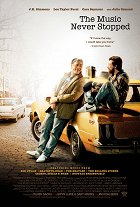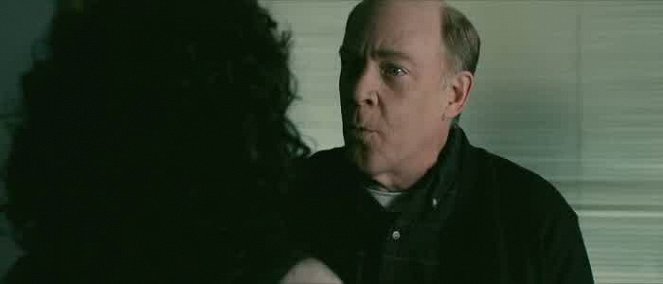Realização:
Jim KohlbergCâmara:
Stephen KazmierskiElenco:
Julia Ormond, J.K. Simmons, Lou Taylor Pucci, Tammy Blanchard, Mía Maestro, Cara Seymour, Scott Adsit, Peggy Gormley, Josh Segarra, James Urbaniak (mais)Conteúdos(1)
Baseado no estudo de caso "O Último Hippie", do Dr. Oliver Sacks (Tempo de Despertar), A MÚSICA NUNCA PAROU mostra a jornada de um pai e um filho se ajustando na cura de um trauma cerebral e a uma vida de oportunidades perdidas. O filme narra o emocionante reencontro entre Henry (J.K. Simmons) e Gabriel (Lou Taylor Pucci) Sawyer, pai e filho, em lados opostos quanto a gostos musicais assim como política e a Guerra do Vietnã. Gabriel desaparece dentro da contracultura depois de um confronto devastador com seu pai. Duas décadas mais tarde, Henry e sua esposa Helen (Cara Seymour) são informados que seu filho foi encontrado perambulando pelas ruas de Nova Iorque.
Gabriel tem um tumor cerebral que causou danos extensivos ao órgão e requer cirurgia imediata. Para Gabriel, passado, presente e futuro são indistinguíveis, enquanto se recupera da operação, ele acredita ainda estar em 1968, era do Vietnã, das festas regadas a ácido e da música psicodélica. Determinados, Henry e a esposa Helen juram se aproximar de Gabriel, que mal consegue se comunicar. Henry começa a pesquisar sobre danos cerebrais, o que o leva à Dra. Dianne Daly (Julia Ormond), uma musicoterapeuta que fez grandes avanços com vítimas de tumores cerebrais através da música. Conforme trabalha com Gabriel, Diane percebe que ele parece responder de modo efetivo à música da era psicodélica (Beatles, Bob Dylan e, particularmente, Grateful Dead), que tem um efeito formidável com o rapaz, já que ele começa a conseguir conversar e se expressar, mesmo que não tenha consciência de que a época da sua música já passou há muito tempo. Não suportando rock'n'roll, Henry começa uma peregrinação pelas bandas dos anos 60 para conseguir animar a alma de seu filho, que começa de fato a formar um vínculo incomum, emocionante e cheio de vida, um vínculo entre pai e filho, que ele achava ter perdido. (Europa Filmes)
(mais)Críticas (2)
As opposed to this flick, 50 First Dates is a well-known piece, but the two movies have a lot in common. Obviously mainly the premise they are based on. And even though this movie is actually a lot more serious, it managed to keep me interested for the entire 105 minutes. The change of the relationship between the father and his son, a lot of emotions, a beautiful score, all these turn this movie into a drama that I will definitely not forget. It’s one of the series of American independent dramas which totally engrossed me. It’s definitely also thanks to the actors J. K. Simmons and Lou Taylor Pucci, who put in some great acting performances and a very interesting and honest portrayal of the father-son relationship.
()
It was a big deal back then. Deep beneath Hangar D at Hollywood Studios, in that top secret laboratory complex, a secret sect of Judeo-Bolshevik Nazis, paid by the corporate-run Illuminati, had accomplished the unprecedented. To create the first artificial intelligence that can make a movie all by itself. It was called Jim Kohlberg ver. 1.0. It did unprecedentedly well on its final exam, quite a tricky assignment: to create a movie for grandmothers, dads, pre-pubescent sons, practically the whole family, even with a dog and a guinea pig. The film has to appeal to the classic mainstreamers as well as New Age sensibilities, and it can be paid for at all costs with Monopoly money. Jim Kohlberg ver. 1.0 has done an incredible job – he has automatically extracted the theme of generations coming together through music, but wisely filtered out a contemporary manifestation where a son introduces his ZZTop dad to the secrets of techno or dubstep. He pulled out classic hits from the 60s and 70s, where the majority opinion is that anyone who doesn't like it is ignorant. In the montage, he moves the audience with Simmons delving into the tenets of hippie rock, finalizing the whole event at a concert where the previously skeptical father really lets loose. Sure, the arrogant audience may feel like they've got a broken record, but for the rest of us, we've got a first-rate load of the best: a chick from the diner who reciprocates the feelings of the biggest loser in her neighborhood (hopefully they'll fix the patch in the future), a son meeting his amnesiac parents after 20 years, a liberal mother and skeptical father, a nasty doctor representing a depriving nasty state institution, the ability to only express yourself when your favorite music is playing nearby (ho ho), it's all here. Even the inventors have formally acknowledged that the device relies more on certainties and we don’t have to worry about it creating any interesting sequences either visually or conceptually, but that's supposedly okay because the subject matter is sooooo heartrending that no one will care less that they actually went to see a film and will give this incredibly clichéd, boring, uninventive, wannabe independent, emotion-milking bullshit an incredibly high rating because it warmed their cockles. Golden sex and violence.
()

